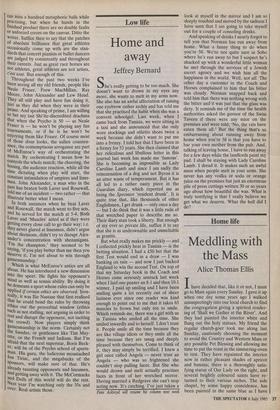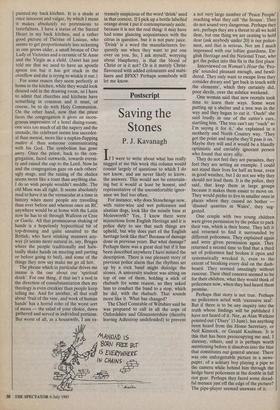Home life
Meddling with the Mass
Alice Thomas Ellis
Ihave decided that, like it or not, I must go to Mass again every Sunday. I gave it up when one day some years ago I walked unsuspectingly into our local church to find the congregation giving a spirited render- ing of 'Shall we Gather at the River'. And they had painted the interior white and flung out the holy statues. My friend the regular church-goer took me along last Sunday, cautiously choosing the moment to avoid the Country and Western Mass or any possible Pet Blessing and allowing me time to put the roast in the simmering-oven to rest. They have repainted the interior now in rather pleasant shades of apricot and banana; there is a thoroughly satis- fying statue of Our Lady on the right, and several brightly coloured saints have re- turned to their various niches. The side chapel, by some happy coincidence, has been painted in the same blue as I have painted my back kitchen. It is a shade at once innocent and vulgar, by which I mean it makes absolutely no pretensions to tastefulness. I have a statue of the Sacred Heart in my back kitchen, and a rather good picture of Therese of Lisieux, who seems to get proportionately less sickening as one grows older, a small bronze of Our Lady of Victories and a ceramic of St Anne and the Virgin as a child. (Janet has just told me that we used to have an apostle spoon too but it has got stuck in the overflow and she is trying to winkle it out.) For some reason they seem perfectly at home in the kitchen, while they would look deuced odd in the drawing room, so I have to admit that churches and kitchens have something in common and it must, of course, be to do with Holy Communion. On the other hand, now that the priest faces the congregation it gives an incon- gruous impression of a hotel dining-room; one sees too much of all the napery and the utensils; the celebrant seems less sacerdot- al than menial, more like a napkin-flapping maitre d. than someone communicating with his God. The symbolism has gone awry. Once the priest, back to the con- gregation, faced outwards, towards eterni- ty and raised the cup to the Lord. Now he and the congregation gaze on each others' ugly mugs, and the raising of the chalice seems more like a toast than anything else. I do so wish people wouldn't meddle. The old Mass was all right. It seems absolutely mad to have it in the vernacular at a time in history when more people are travelling than ever before and whereas once an RC anywhere would be at home with the Latin now he has to sit through Walloon or Cree or Gaelic. All that promiscuous shaking of hands is a hopelessly hypocritical bit of top-dressing and quite unsuited to the British, who have stinking manners any- way (it seems more natural in, say, Bruges where the people traditionally and habi- tually shake hands on meeting and parting or before going to bed), and some of the things they now say make me go all hot.
The phrase which in particular drives me insane is the one about our 'spiritual drink'. For one thing, if that isn't a nod in the direction of consubstantiation then my theology is even creakier than people keep telling me. And for another, all that stuff about 'fruit of the vine, and work of human hands' has a horrid echo of the worst sort of menu — the salad of your choice, dawn gathered and served in individual portions. But worst of all, as a housewife, I am ex- tremely suspicious of the word 'drink' used in that context. If I pick up a bottle labelled orange drink I put it contemptuously aside, because it is not the real thing: it may have had some glancing acquaintance with the citrus in question, but it is not pure juice. 'Drink' is a word the manufacturers fre- quently use when they want to put one over on you. So, I ask myself, worrying about blasphemy, is that the blood of Christ or is it not? Or is it merely Christ- flavoured with added colourants and stabi- lisers and BF8X? Perhaps somebody will let me know.



















































 Previous page
Previous page